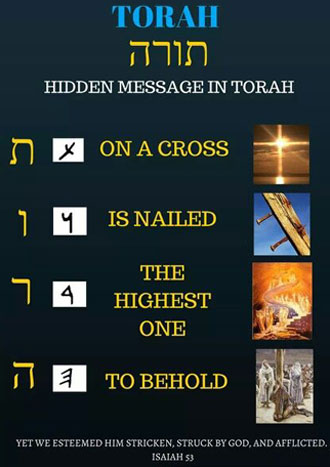
~ Christopher Caleb Cain As a Torah observant Christian, you are able to see Paul's writings in a new light as you read them in the proper context now that you know that the law has not been abolished as stated in Matthew 5:17. Probably the most confusing book in the New Testament for those new to Torah is Hebrews. To many, it seems to downplay the Sabbath and make the Torah obsolete. It has caused factions in the Hebrew Roots movement and some want to throw out Hebrews, claiming that Paul did not write it. And extreme factions of the Hebrew Roots movement have ignorantly denounced all of Paul's writings. Mainstream Christianity references the beliefs of these extreme factions to discredit the Hebrew Roots movement. So to be able to minister the Truth without running into preconceived stigmas, many of us no longer refer to ourselves as Hebrew Roots. I refer to myself as a Torah observant Christian who believes that the whole testament of God is alive and relevant. The Core of the Hebrews Controversy Hebrews Chapter 4 The mainstream interpretation is that when you believe, you enter into the Sabbath rest every day therefore, you are always resting, so no need to honor a certain day. This is almost entirely debunked by verse 1. In verse 1 and verse 11, it says that you must strive to enter that millennial kingdom rest by being obedient. The fact that he is already talking to believers contradicts the mainstream interpretation that you must believe to immediately be in his rest. Hebrews 4:1 NASB — Therefore, let us fear if, while a promise remains of entering His rest, any one of you may seem to have come short of it. Hebrews 4:11 ESV — Let us therefore strive to enter that rest, so that no one may fall by the same sort of disobedience. Paul is telling them that it took obedience for those in the Exodus to enter into rest which was the Promised Land and that it's going to take obedience to enter into his rest at his second coming. Paul is talking about a coming Sabbath day of rest which is referring to the millennial kingdom. We know it is a thousand years. And this metaphor is understandable because we know Peter told us that to God a day is a thousand years and a thousand years is a day. As God is calling the Thousand Years the Sabbath Day, and we know that the Sabbath is the seventh day of the week, it does seem that the time of man is 6000 years representing the other 6 days of the week. In chapter 20 of Revelation, it mentions the 1000 years 6 different times. I have thought that it may be a hidden message that there will be 6000 years before it comes. If the time of man is 6000 years, and if Yeshua died at the 4000 year mark, then we could be looking very close to the beginning of the end. For example, the majority have him crucified somewhere between the year 29 and 32. Fast forward 2000 years and with everything feeling like we are in birthing pains, it seems feasible that the world could get out of hand over the next 6 or 7 years leading up to the Great Tribulation and the day of judgement between 2029 and 2032.
Hebrews Chapter 8 They must believe chapter divisions mean the whole start of a different concept, but if you read Hebrews 7 you will see that Hebrews 8 is the conclusion of what Hebrews 7 starts. We see in Hebrews 7 Yeshua replaced the levitical priesthood because under it, perfection could not be obtained. Hebrews 7:11 ESV — Now if perfection had been attainable through the Levitical priesthood (for under it the people received the law), what further need would there have been for another priest to arise after the order of Melchizedek, rather than one named after the order of Aaron? In Chapter 7, two verses get hand-picked out of context. Hebrews 7:12 ESV — For when there is a change in the priesthood, there is necessarily a change in the law as well. This is one of the verses that people say shows that the law is obsolete. The other scripture that is handpicked in Chapter 7: They interpret this scripture to show that there are two different covenants, when simply it is just saying Yeshua made the covenant better. This brings us right into Hebrews 8. Hebrews 8:1 NASB — Now the main point in what has been said is this: we have such a high priest, who has taken His seat at the right hand of the throne of the Majesty in the heavens, The first 5 verses of chapter 8 continue with the narrative of Yeshua the high priest replacing the levitical priesthood, and then it goes into the next 3 scriptures where translators and modern-day Christianity has warped into another meaning. Hebrews 8:6 ESV — But as it is, Christ has obtained a ministry that is as much more excellent than the old as the covenant he mediates is better, since it is enacted on better promises. Hebrews 8:6 reiterates Hebrews 7:22 as it states that Yah's everlasting covenant has been made better and is now being overseen by the Messiah. The covenant has been renewed or amended. The rest of the chapter is a continuation of Hebrews 8:8 which quotes Jeremiah 31 about writing the renewed and improved covenant on our hearts. Hebrews 8:13 ESV — In speaking of a new *covenant*, he makes the first one obsolete. Once again most translators added the word covenant. But clearly after reading Hebrews 7 and 8, The above knowledge will help you and your sharing of the Truth. |

|
ברוך אתה יי אלוהינו מלך העולם Blessed are You O YAHWEH our ELOHIM, King of the Universe |

|

